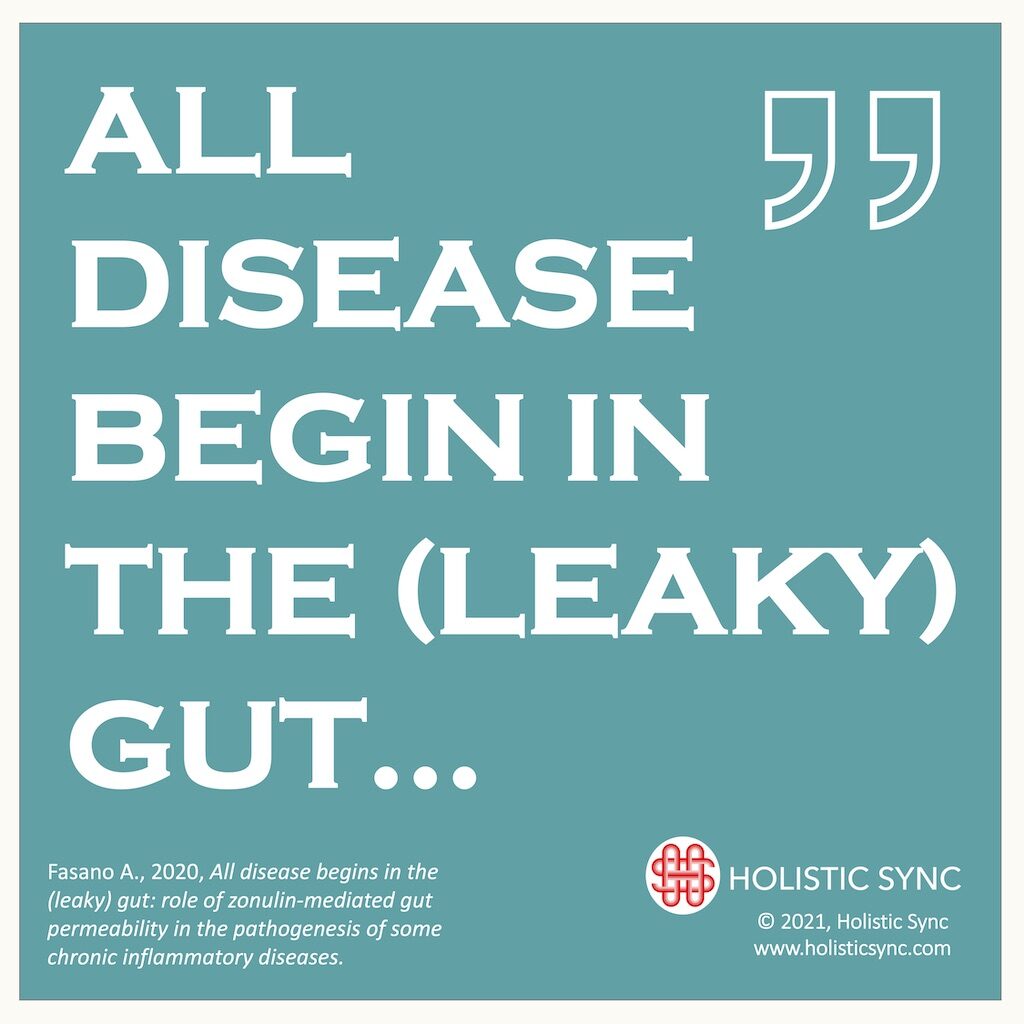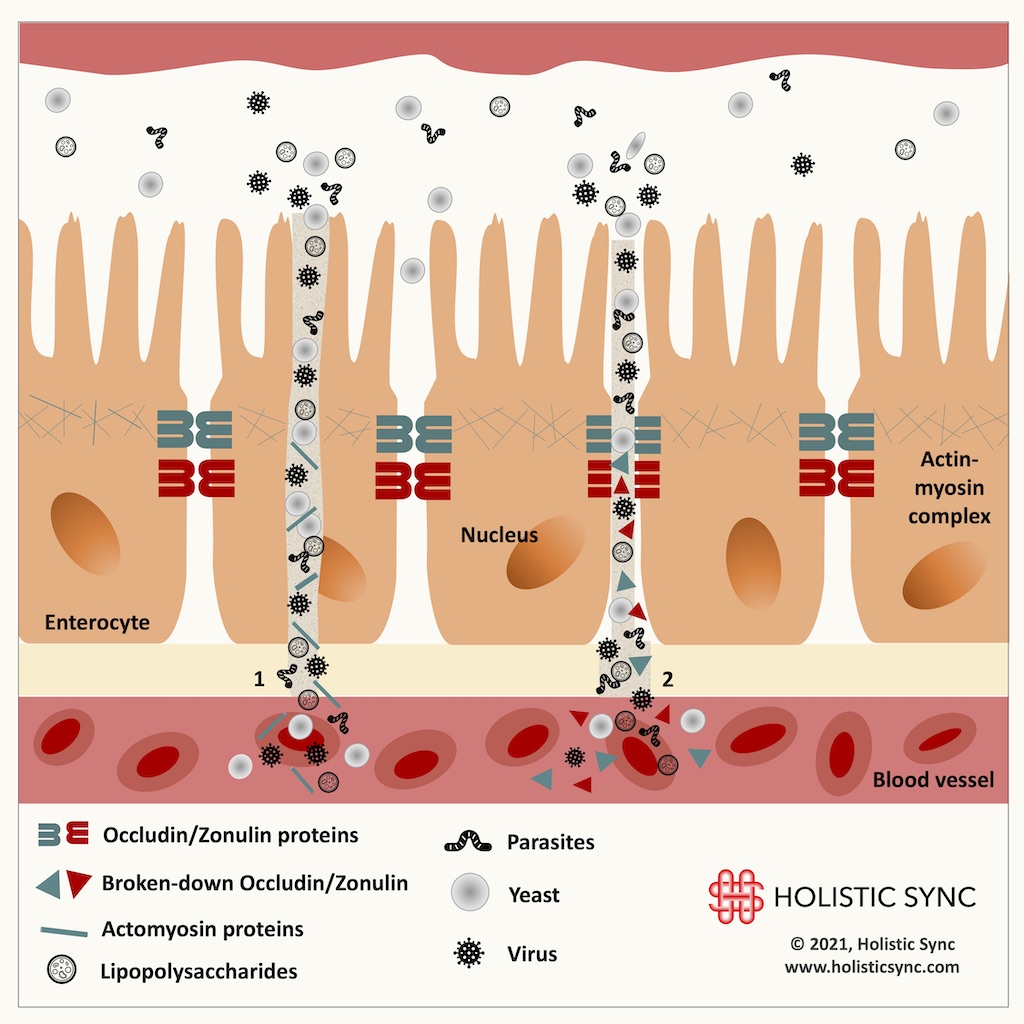- Leaky Gut Syndrome, Autoimmune Diseases, Metabolic Conditions, Chronic Fatigue Syndrome, Neurodegenerative Diseases, Arthritis, Brain Fog, Eczema, Food Sensitivities, Psoriasis, Chronic Diseases, Depression, Mental Disorders
Leaky Gut: how the intestinal barrier and immune system influence chronic diseases.

Author: Dr. Andréa Fuzimoto

Disclosure: This site contains links to our stores. Some others may be affiliate links by which we may earn a small commission when you purchase certain products or services. This does not affect the prices that you may pay for them. By purchasing from us you help support this website and our services. Thank you!
Leaky gut is the breakage of the intestinal lining that allows the passage of unwanted substances into the blood circulation. As a consequence, it can generate systemic inflammation and disrupt the function of different organ systems. From marital distress, chronic stress, mood disorders, infections, intestinal inflammation, endocrine problems, diet to medications, leaky gut can arise from a variety of influences revealing its multifactorial condition.
If you got a little bit shocked with “marital distress” as a triggering factor of leaky gut, you got it right! It sounds crazy but we are still discovering a lot about what triggers it and how fluctuating our gut health can be depending on emotional, mental, nutritional, endocrinological, and immunological factors. In 2018, a group of researchers investigated the relationship between marital distress and the intestinal translocation of endotoxins to verify if the intestinal wall of married couples was more permeable to them.1 Two endotoxins markers were tested in the serum of 43 healthy couples exhibiting hostile behavior, the gram-negative bacterial polysaccharide-binding protein (LBP) and soluble CD14 (sCD14). The inflammatory biomarkers C-reactive protein (CRP), interleukin 6 (IL-6), and tumor necrosis alpha (TNF-α) were also measured
The study revealed that the individuals who exhibited more hostile behavior had higher LBP in the blood serum, and those with a combination of more hostile behavior with a history of mood disorders/depression resulted in a higher LBP/sCD14 ratio.1 Since these gram-negative bacteria and their endotoxins are not supposed to cross from the gut into the bloodstream, the presence of high LBP and sCD14 showed that these people probably had leaky gut. In this study, the researchers associated the increased permeability of the intestinal lining with unhappy relationship interactions.1 Additionally, these higher markers pointed to leaky gut linked with more systemic inflammation. The marital distress with frequent stress episodes between the members of the couple may chronically fuel inflammation. Once endotoxins enter the bloodstream they cause an increase in inflammatory markers which predisposes people to systemic inflammatory diseases. Talk about how a stressful and unhappy marriage can influence our overall health! Nonetheless, a leaky gut is more likely to be a multifactorial condition with several key players in place
Mechanism of Leaky Gut and triggering factors
Leaky gut syndrome or increased permeability of the intestinal lining happens when macromolecules such as food particles, pathogens, and bacterial toxins cross the gut epithelial lining into the blood circulation when they are not supposed to. This translocation can happen in two ways. First, the toxins or foreign substances can cross through the damaged “tight junctions” in between the cells. This is called paracellular translocation. The tight junctions are formed by a series of proteins (e.g. occludin, claudin, and others) that tie one cell to the next and regulate which particles can pass into the bloodstream. If the tight junctions are disrupted, unwanted substances can cross easily. Second, particles can cross right in the middle of a cell. This is called transcellular translocation. This means that there is destruction of the intestinal cells and their structures such as the cytoskeleton (e.g. actin-myosin complex). In both scenarios, the undesirable substances that reach the blood cause an immune reaction, an increase in inflammatory cytokines which may lead to systemic inflammation. Also, chronic endotoxin exposure has been associated with atherosclerosis, cardiovascular disease, and diabetes.1

Paracellular and transcellular translocation of antigens through the gut barrier. These antigens can be bacterial toxins, yeast, viruses, food particles, and others. They enter the blood circulation and may generate systemic inflammation.
At this point, we know that the factors that trigger leaky gut are diverse and need to be evaluated individually. Many things can influence intestinal permeability such as the foods that we eat, the medications that we take, chronic stress, hormonal imbalances, sleep deprivation, infections, intestinal dysbiosis, emotional upsets and traumas, the presence of already existing inflammatory conditions, and genetic susceptibility to develop autoimmune diseases, to cite a few. As we face a more toxic world reflected in the exposure of pesticides, herbicides, heavy metals, pollutants, and harmful chemicals perhaps the intestinal lining is mirroring the failing integrity of the ecosystems of the world around us. The intestinal barrier is essential to the defense system against several potentially harmful substances from our surrounding environment. The more toxic interactions we have with the outside, the more overloaded and challenged our immune system is.
“All disease begins in the (leaky) gut”
As mentioned by one of my favorite researchers in the field of leaky gut, Dr. Fasano, “All disease begins in the (leaky) gut”.2 This is a modern reflection of what Paracelsus already considered, “All disease begins in the gut”. When we look at the recent research, it is mind-blowing how many body structures can be affected by leaky gut, and how many diseases can be involved as a pre-existing condition to it or a consequence of it. Once systemic inflammation develops due to a leaky gut, many organ systems can be compromised by it. Some examples are the brain, skin, joints, muscles, and mitochondrial function. Thus, symptoms may vary depending on which organs are affected. At this point you might be asking, but what are the symptoms of leaky gut? Well, a person may have abnormal gastrointestinal issues such as diarrhea, constipation, bloating, and gas, or no symptoms at all. There may be different levels of leaky gut. If there is small leakage through the tight junctions it sometimes causes a low-grade inflammation that does not cause many symptoms locally or distally. However, with time, systemic inflammation may increase and affect distal organs more noticeably causing, for instance, chronic arthritis, muscle pain, eczema, neuroinflammation, brain fog, concentration problems, fatigue, or depression.
If big food particles are crossing over into the blood, it may trigger an immune response to them with the development of food allergies and sensitivities. On the other hand, there are cases in which the person has destruction of the gut epithelial tissue caused by an autoimmune disease such as untreated Celiac Disease (CD). Lipopolysaccharide (LPS) is an endotoxin present in the membrane of gram-negative bacteria and a study showed that LPS-induced systemic inflammation in an animal model caused brain inflammation, mitochondria damage, and oxidative injury.3 This shows how a leaky gut can influence systemic and brain health. The consequences of leaky gut reach the cells and affect different structures at a molecular level. Thus, the situation may differ in extension and severity and/or fluctuate in each person from a small local leakage and a condition that can perhaps increase over time, to full-blown tissue destruction. In some studies, leaky gut preceded the symptoms and onset of diseases such as inflammatory bowel disease and multiple sclerosis. Also, the intestines have a large number of immune cells. The gut-associated lymphoid tissue (GALT) which consists of immune cells such as B and T lymphocytes, macrophages, dendritic cells, and others represents 70% of the entire human immune system.4,5 This means that the gastrointestinal system plays an important role in our general health and in immune-mediated diseases.
Leaky Gut as the mediating factor of many chronic diseases
In some Traditional Medicines, the gastrointestinal system is seen as the mediating factor balancing the whole body. In fact, leaky gut together with the alterations of intestinal microbiota and microbiome has been linked to a wide range of inflammatory illnesses. For instance, studies suggest that defects in the gut, blood-brain, and blood-spinal cord barriers increase the vulnerability of tissues to external factors thus playing an important role in the development of Parkinson’s Disease (PD) and Amyotrophic Lateral Sclerosis (ALS).6 Researchers also showed that leaky gut and intestinal dysbiosis are key elements in intestinal inflammation and pathogenesis of PD, and hypothesized that the gut status of PD patients can anticipate the pre-symptomatic evolution and its diagnosis.7 There is also evidence that chronic fatigue syndrome (CFS) is accompanied by an increased translocation of LPS endotoxins thus revealing an Intestinal Mucosal Dysfunction (IMD).8 In a case report, a 13-year-old girl diagnosed with CFS was treated with a “leaky gut diet” and antioxidants resulting in complete remission of symptoms.8
Interestingly, in another research on suicide and depression, preliminary findings showed alterations in biomarkers of gut permeability and inflammation in patients with a history of a recent suicidal attempt (rSA) and major depression disorders with no history of suicide attempt (nsMDD).9 This study demonstrated a possible relationship between leaky gut and psychiatric issues. This makes sense as in many studies depression is correlated with inflammatory processes.10 In another intriguing investigation with 70 women, the researchers examined if recurrent pregnancy loss (RPL) could be attributed to leaky gut.11 An increased intestinal permeability could lead to the systemic circulation of pro-inflammatory molecules which could then induce endometrial inflammation. The results showed that there was a high prevalence of abnormal intestinal permeability with an increase in circulating LPS, anxiety, and depression in the RPL women compared to controls.11 The authors concluded that leaky gut can allow the passage of immune triggers into the bloodstream, elicit an endometrial immune response, and contribute to miscarriages.
Furthermore, some researchers believe that psoriasis is a disease characterized by leaky gut with the presence of systemic endotoxins.12 If you have skin disorders, leaky gut may likely aggravate them. Scientific investigations also show that leaky gut may play a part in the development of different autoimmune conditions such as Multiple Sclerosis (MS), Inflammatory Bowel Diseases (IBD) such as Crohn’s Disease (CD) and Ulcerative Colitis (UC), and Ankylosing Spondylitis (AS).13 Leaky gut also exacerbated the progression and disease activity of Systemic Lupus Erythematosus (SLE) in an animal model.14 Not only inflammatory and autoimmune conditions have been linked to the leaky gut but also cancers were associated with it.15
Lastly, biomarkers of leaky gut and systemic inflammation were elevated in aging showing that it may play a significant role in the development of age-related inflammation and frailty.16 Advancing aging in healthy older adults was also accompanied by increased translocation of gut bacteria of endotoxins and a low diverse microbiota composition with both causing low-grade inflammation.17 So, it seems that as we age we are more predisposed to leaky gut. Excitingly, the administration of a human-origin probiotic cocktail improved aging-related leaky gut and inflammation in an animal model, thus promoting the improvement of metabolic and physical functions.18 These are some examples of how leaky gut can be involved in different illnesses and be a big piece of the puzzle in individual clinical presentations of patients with chronic conditions.
The intestinal barrier is the “biological door” to inflammation, autoimmunity, and many diseases.15 Together with the microbiota-microbiome, the lymphoid tissue in the gut, the neuroendocrine network, environmental triggers, and genetic predisposition to diseases, the gut barrier plays an important role in our defense-immune system. It seems excessive to think that the disruption of the intestinal barrier is implicated in so many illnesses. It is true that not all chronic inflammatory diseases have been linked to gut permeability.2 However, if we think of the enormous amount of increasing toxins and disrupters to which we are exposed daily, it is not inconceivable that many health dysfunctions may be related to it. The gastrointestinal system is the mediator and balancing element of all other organ systems, and the origin of leaky gut often involves multiple factors. Thus, it needs a careful diagnostic evaluation and an individualized tailored treatment plan. Evaluating gastrointestinal health is central and often the first step to improving health in several chronic diseases.

Dr. Andréa Fuzimoto, DAOM, MSTCM, MSCS, CSAS, Dipl. O.M (NCCAOM®/USA), L.Ac. (CA/USA); PT/Acu (BR) is a clinician and researcher working with Holistic Integrative Medicine (HIM) with emphasis in gastrointestinal, neurological, and immunological conditions. Patients look for her careful diagnostic evaluation, strategic treatment planning, and compassionate care. As a researcher, she is a peer-reviewed published author and a certified peer-reviewer contributing to different scientific journals. She has trained and worked in centers of excellence such as the Stanford University Medical School (Pain Medicine Division) with NIH-funded Clinical Trials, and the California Pacific Medical Center (CPMC), at the Stroke Clinic, among others. For more information on her specialties and certifications, visit Linkedin.
References
- Kiecolt-Glaser J, Wilson S, Bailey M, et al. Marital Distress, Depression, and a Leaky Gut: Translocation of Bacterial Endotoxin as a Pathway to Inflammation. Psychoneuroendocrinology. 2018;(98: 52-60). doi:https://dx.doi.org/10.1016%2Fj.psyneuen.2018.08.007
- Fasano A. All disease begins in the (leaky) gut: role of zonulin-mediated gut permeability in the pathogenesis of some chronic inflammatory diseases. F1000 Res. 2020;(Faculty Rev-69). doi:https://dx.doi.org/10.12688%2Ff1000research.20510.1
- Noble F, Rubira E, Boulanouar M, et al. Acute systemic inflammation induces central mitochondrial damage and mnesic deficit in adult Swiss mice. Neurosci Lett. 2007;Vol, 424(Issue 2):106-110. doi:https://doi.org/10.1016/j.neulet.2007.07.005
- Vighi G, Marcucci F, Sensi L, Di Cara G, Frati F. Allergy and the gastrointestinal system. Clin Exp Immunol. 2008;(153 (Suppl 1):3-6).
- Claud E, Walker A. Chapter 5 – The Intestinal Microbiota and the Microbiome. In: Gastroenterology and Nutrition: Neonatology Questions and Controversies. ; 2008:73-92. https://doi.org/10.1016/B978-1-4160-3160-4.10005-7
- Fang X. Impaired tissue barriers as potential therapeutic targets for Parkinson’s disease and amyotrophic lateral sclerosis. Metab Brain Dis. 2018;(33, 1031-1043). doi:https://doi.org/10.1007/s11011-018-0239-x
- Seguella L, Sarnelli G, Esposito G. Leaky gut, dysbiosis, and enteric glia activation: the trilogy behind the intestinal origin of Parkinson’s disease. Neural Regen Res. 2020;(15(6):1037-1038). doi:https://doi.org/10.4103/1673-5374.270308
- Maes M, Coucke F, Leunis J. Normalization of the increased translocation of endotoxin from gram negative enterobacteria (leaky gut) is accompanied by a remission of chronic fatigue syndrome. Neuro Endocrinol Lett. 2008;(29(6):902-10). https://pubmed.ncbi.nlm.nih.gov/19112401/
- Ohlsson L, Gustafsson A, Lavant E, et al. Leaky gut biomarkers in depression and suicidal behavior. Acta Psychiatr Scand. 2019;(139(2):185-193). doi:https://doi.org/10.1111/acps.12978
- Kohler O, Krogh J, Mors O, Benros M. Inflammation in Depression and the Potential for Anti-Inflammatory Treatment. Curr Neuropharmacol. 2016;(14(7):732-42). doi:https://doi.org/10.2174/1570159×14666151208113700
- Tersigni C, D’Ippolito S, Di Nicuolo F, et al. Recurrent pregnancy loss is associated to leaky gut: a novel pathogenic model of endometrium inflammation? J Transl Med. 2018;(16(1):102). doi:https://doi.org/10.1186/s12967-018-1482-y
- Ely P. Is psoriasis a bowel disease? Successful treatment with bile acids and bioflavonoids suggests it is. Clin Dermatol. 2018;(36(3):376-389). doi:https://doi.org/10.1016/j.clindermatol.2018.03.011
- Fasano A. Leaky gut and autoimmune diseases. Clin Rev Allergy Immunol. 2012;(42(1): 71-8). doi:https://doi.org/10.1007/s12016-011-8291-x
- Thim-Uam A. Leaky-gut enhanced lupus progression in the Fc gamma receptor-IIb deficient and pristaneinduced mouse models of lupus.
- Fasano A. Zonulin and its regulation of intestinal barrier function: the biological door to inflammation, autoimmunity, and cancer. Physiol Rev. 2011;(91(1): 151-75). doi:https://doi.org/10.1152/physrev.00003.2008
- Qi Y, Goel R, Kim S, et al. Intestinal Permeability Biomarker Zonulin is Elevated in Healthy Aging. J Am Med Dir Assoc. 2017;(18(9):810.e1-810.e4). doi:https://doi.org/10.1016/j.jamda.2017.05.018
- Stehle Jr J, Leng X, Kitzman D, Kicklas B, Kritchevsky S, High K. Lipopolysaccharide-binding protein, a surrogate marker of microbial translocation, is associated with physical function in healthy older adults. J Gerontol Biol Sci Med Sci. 2012;(67(11):1212-8). doi:https://doi.org/10.1093/gerona/gls178
- Ahmadi S, Wang S, Nagpal R, et al. A human-origin probiotic cocktail ameliorates aging-related leaky gut and inflammation via modulating the microbiota/taurine/tight junction axis. JCI Insight. 2020;(5(9):e132055). doi:https://doi.org/10.1172/jci.insight.132055
